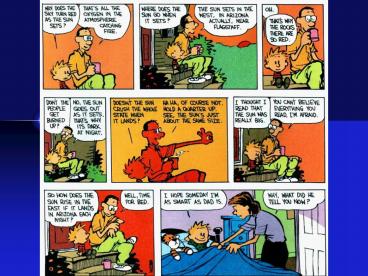Calvin Cartoon PowerPoint PPT Presentation
1 / 19
Title: Calvin Cartoon
1
Calvin Cartoon
2
NATS 102 Section 13 The Universe and Humanity
Origin and Destiny Space Sciences Building, Room
308 Tuesday Thursday 200-315
3
Welcome to the Planetary Sciences Department
4
Recommended Text Book
The Physical Universe K. Krauskopf A.
Beiser 11th edition (2005)
Students are responsible for all material in
reading assignments, the textbook (assigned
sections) and the lectures.
5
Recommended Book
Elements of Style, William Strunk E. B. White
(2000) ISBN 0-205-30902-X.
6
Grades
A89 B 80-89 C 70-79 D 60-69 E 7
Quiz
There will be three quizzes. Each are worth 10
of the grade. No final exam
8
Writing Assignment
One writing assignment a press report on a
scientific topic and must be 400-600 words.
Grading is based on content, grammar, and
clarity. It can be revised for additional
points.
9
Homework
No late homework is accepted. The lowest homework
grade will be dropped from the final grade.
10
In Class Assignments
Extra in-class assignments may be given randomly
throughout the semester. They will be counted as
a homework.
11
Strategy
Do the homework. Come to class and ask
questions. Dont leave homeworks/assignments/study
to the last minute. Read the text book. Lead a
Buddist life right mind, right body.
12
Topics
Emergence of science Why did it take so
long? Newtonian physics What is the nature of
science? Planetary Astronomy. Why do the
planets differ? Planetary Evolution Global
warming Evolution of the Universe When how
did it begin? Evolution of Life Genetics
13
Todays Lecture
Definition of Science
- Science attempts to explain nature
- It adheres to a precise rigorous methodology.
14
Observing and Experimenting
- We probe nature by observation experimentation.
- Observations constitute the record of
characteristics of nature. - Through experiments we establish the behavior of
natures processes.
15
Looking for Patterns
- Science starts with the recognition of repeatable
patterns in phenomenon. - Its art lies in finding patterns that tell us
something about workings of overlapping phenomena
in the Universe. - Mathematics is used to precisely describe the
patterns, and quantitatively predict nature.
16
Hypotheses and Theories
- The only useful hypotheses are those that are
falsifiable. That is specific predictions that
are testable and can be proven wrong. If
predictions are wrong, the theory is discarded. - Observations and/or experiments must be repeated
and reproducible by other scientists. - Science does not rely upon belief, it relies upon
testing. - Prejudice and pre-conceived notions are difficult
to dispell or even recognize. Scientific
progress often follows the realization and
removal of incorrect assumptions.
17
Is Astrology Science?
- People realized early on that the positions of
planets and the sun in the sky are correlated
with seasons, plant growth, and thus animal
behavior. - Might the cosmos directly effect people their
psyches? - Astrology claims that patterns in human behavior
correlate with the position of the planets. - This satisfies one criteria of science. Is it
falsifiable. - Lets see if it is science.
18
An experiment
19
Summary
Science follows a specific methodology, which
enables us to precisely investigate the elements
of nature. A scientific theory must be
based on experimentation observation
describe nature displayed a repeatable
experiment not be based on belief be
falsifiable Reading recommendation First
section of Chap. 1

